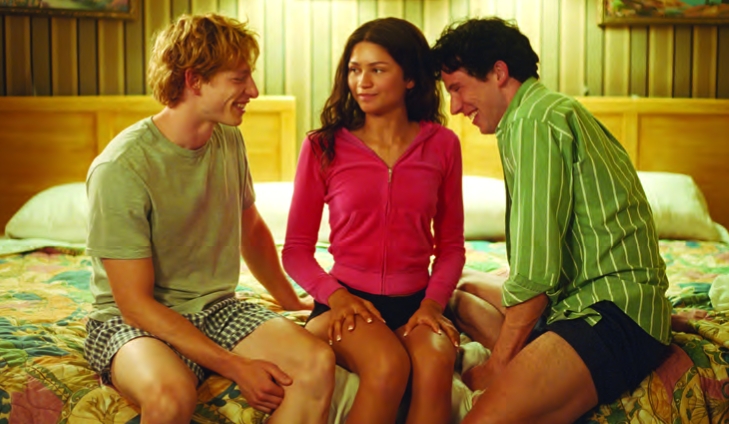
(From left) Mike Faist as Art, Zendaya as Tashi and Josh O’Connor as Patrick in “Challengers” directed by Luca Guadagnino. ‘Challengers’ boosts interest in tennis and Black female representation in the sport
July ushers in crisp tennis whites, grass courts and strawberries and cream snacks, signaling the start of Wimbledon. Wimbledon is one of four major tournaments in the tennis calendar along with the U.S. Open, the Australian Open and the French Open. Tennis is typically associated with WASP (White Anglo-Saxon Protestant) culture stemming from its aristocratic roots in England and France. Under the expectation of restrained sportsmanlike conduct lies an exclusionary history of the sport.
Despite this, searches for “adult tennis lessons” were up by 245% this spring, according to consulting company Venture Smart. Not because of Wimbledon or the upcoming Paris 2024 Olympics, but because of the latest tennis film, “Challengers,” starring Zendaya, which opened in theaters April 26.
“Challengers” is a titillating Luca Guadagnino film about desire, love and loss set against the backdrop of professional tennis. Tashi Duncan (Zendaya) is a tennis-prodigy-turned-coach who suffered a career-ending injury in college right before she turned pro. Her husband Art (Mike Faist) is a professional tennis player in the twilight of his career who has won every one of the four Grand Slam tournaments except the U.S. Open. Before he can qualify for the U.S. Open, Art must face off with his former best friend and Tashi’s ex-boyfriend, Patrick (Josh O’Connor), a washed-up tennis player in a lowly challenger match with a high-stakes reward.
The film addresses race and class tensions in the tennis world through plot, dialogue and costuming. Wealth disparities are explored between the top-ranked tennis players relationship with these guys.”
Currently, the second-best player in the world is 20-year-old Coco Gauff, an African American tennis star who won the U.S. Open last year. She was also the highest-paid female athlete in 2023.
Other female African American players ranked in the top 100 include Sloane Stephens, Taylor Townsend, Madison Keys and Hailey Baptiste. These players stand on the shoulders of Althea Gibson, the first with their Aston Martin endorsements and Uniqlo clothing sponsorships and lower-ranked players who sleep in cars the night before matches due to insufficient funds for a hotel room. Racist tennis opponents who smash rackets and curse on the court when they lose to Tashi are shown and picked apart.
Screenwriter Justin Kuritzkes told Vulture why he wrote Tashi as a Black woman in the script. He said, “The story of American tennis is Black women for the past however many decades.” He added, “Her being a Black woman informs a lot about how she navigates her situation and how she navigates her Black tennis player to win a Grand Slam tennis event in 1956 at the French Open; and Arthur Ashe, the first Black man to win a Grand Slam title at the 1968 U.S. Open.
The tennis world was not kind to Gibson, who won her first Wimbledon singles title in 1957. Exclusions from clubs and tournaments were common. Today, discriminatory comments from fans and media are still a common occurrence, along with biased officials.
At the 2001 Indian Wells Open tournament, Venus and Serena Williams and their father Richard were subject to racial abuse after false allegations of match-fixing. Serena did not play in that tournament for 14 years after being repeatedly booed and heckled by fans. Venus didn’t return until 2019.
Last
year, at the French Open, Stephens, ranked 45th in the world, told
reporters that racism has “obviously been a problem my entire career. It
has never stopped. If anything, it has only gotten worse.”
There’s
a bright spot closer to home. Albert “Bootsie” Lewis and Conway Haynes,
founding board members of Dorchester-based Sportsmen’s Tennis and
Enrichment Center, were inducted into the USTA New England Hall of Fame
June 7. They were honored for their contributions to making tennis
accessible to under-resourced youth in Boston, primarily along the Blue
Hill Ave corridor, since the 1960s.
During
the breakfast ceremony for the pair at Sportsmen’s on June 15, the
familiar thwack of tennis balls could be heard as children laughed and
rallied on a court nearby. One girl laughed loudly, spinning her racquet
around, while exclaiming she was Serena. One said she was Coco. “Who is
Coco?” another child asked.
They’ll have to watch Wimbledon to find out.